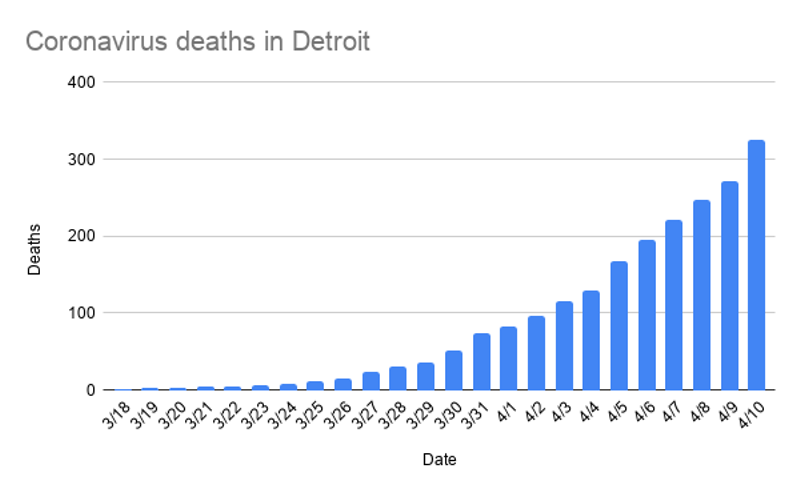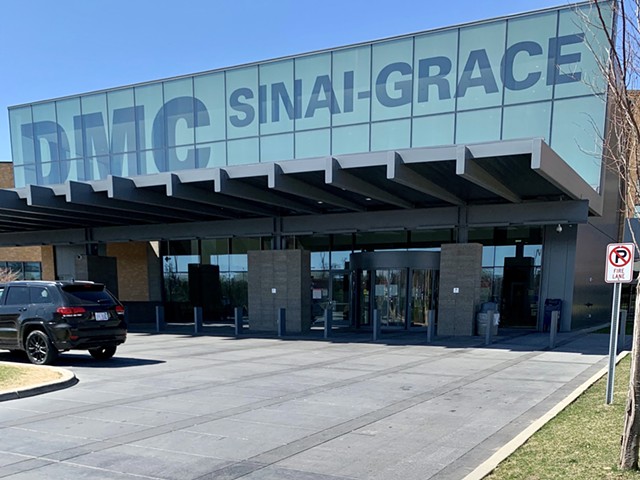
Courtesy of TCF Center
The TCF Center in downtown Detroit has been converted into a 1,000-bed hospital to treat coronavirus patients.
Detroit reported 54 new coronavirus deaths on Friday, the most in a single day so far, bringing its total to 326.
The previous record for deaths in one day in Detroit was 38 on April 5. The city now has more deaths than all of Ohio, Indiana, or Wisconsin. Detroit also has a higher death rate than New York City, the U.S. epicenter of the outbreak.
The spike in deaths comes three days after Mayor Mike Duggan expressed cautious optimism that the city was beginning to flatten the curve. Between Monday and Thursday, Detroit averaged 26 daily deaths.
Public health officials have warned that the peak of deaths in Michigan could be this week or next.
Detroit now has more than 6,000 positive COVID-19 cases. Making up 6.7% of the state’s population, Detroit has more than a quarter of the deaths.
More than 150 Detroit Police Department employees, including Chief James Craig, have tested positive for COVID-19, and an additional 525 officers and police civilians were under quarantine as of last week. At least 43 firefighters and medics also have confirmed infections, and more than 75 have been under quarantine.
More than 80 Wayne County deputies have tested positive for COVID-19, and an additional 78 are under quarantine.
Two state lawmakers from Detroit — Reps. Tyrone Carter and Karen Whitsett —have tested positive for the coronavirus, and state Rep. Isaac Robinson, also from Detroit, died from a suspected infection.
Detroit City Council President Brenda Jones also tested positive for COVID-19.
The coronavirus has claimed the lives of two city inspectors, a bus driver, three members of the police department, and a Detroit Fire Department captain.
To curb the spread on city buses, the city began distributing surgical masks to riders this week. Duggan has said he’s unwilling to stop bus service because it’s “as essential to this community as police, fire, and EMS.”
“We have a number of people in the city who are doing essential jobs working at hospitals, doctors offices, grocery stores, who are only able to get to work because the buses are there,” Duggan said. “What we have to do is make the buses safe.”
Contagious diseases often spread faster in lower-income areas because many people rely on public transit, live in close quarters, and have jobs without paid sick days. A disproportionate number of lower-income residents also work in the service industry, where employees are in close contact with the public.
The coronavirus has infected and killed a disproportionate number of Black people, who make up 13.6% of Michigan's residents but at least 40% of the COVID-19 deaths. The number could be significantly higher because there's no racial data on 28% of the fatalities. White people, meanwhile, make up 28% of the deaths but 75% of the state's population.
Metro Times investigated the impact of the inequities in a cover story this week.
On Thursday, Gov. Gretchen Whitmer announced the creation of the Michigan Coronavirus Task Force on Racial Disparities, which will be responsible for gathering feedback from the most impacted communities and recommending ways to combat health care and economic disparities.
As hospitals run out of space to treat coronavirus patients, Detroit's TCF Center is expected to begin taking patients Friday. The building in downtown Detroit has been converted into a field hospital for up to 1,000 people.
Stay on top of Detroit news and views. Sign up for our weekly issue newsletter delivered each Wednesday.







